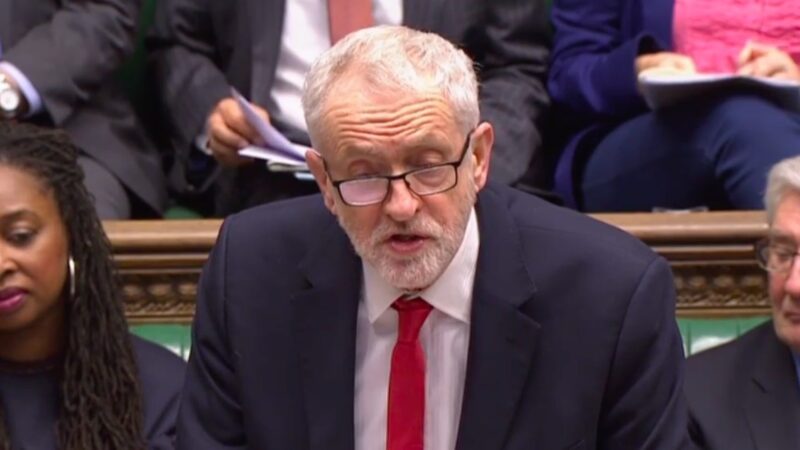
“If there was a case of a young white boy with blonde hair, who later dabbled in class A drugs, and conspired with a friend to beat up a journalist would he deport that boy?” Jeremy Corbyn challenged the Prime Minister across the despatch box this afternoon. Referring to the PM here in this punchy comparison, we saw the Labour leader fired up and taking the fight to a personal level in a way that he never normally does. The first part of the session today was predictably taken up by the UK government’s deportation policy as Corbyn laid bare the stark hypocrisy. And this was definitely one of his strongest performances, with the Islington MP landing some clever blows and maintaining a clear and concise line of attack. He also took Boris Johnson to task over the handling the death of Harry Dunn, and questioned the PM on the one-sided nature of the UK’s extradition relationship with the United States.
Is it right that someone who came here when they were five, was groomed into trafficking drugs, served a sentence and has never since reoffended be deported? This was the first question from the Labour leader as he highlighted the plight of one of this week’s deportees to cries of “shame” from the opposition benches. “Is it one rule for young black boys from the Caribbean and another for white boys from the US?” The PM was obstinate in his defence of the deportations as Corbyn accused the government of trying to mislead the public in suggesting it was only deporting foreign nationals guilty of murder, rape and other similarly serious offences. Johnson replied that it was “absolutely right” to deport foreign national offenders. He also accused the Labour leader of conflating this week’s deportation with those of the Windrush generation, when Corbyn said that the government had “learnt absolutely nothing” from the scandal two years ago.
Moving onto ongoing issues with the US, the Labour leader highlighted the case of Harry Dunn and the row over the extradition of Anna Sacoolas. Corbyn declared that Dominic Raab had misled the family for not disclosing that she was previously a CIA agent. He called for the Foreign Secretary’s removal from office and challenged the PM to clarify: “Is Anna Sacoolas being shielded from justice because she is a former CIA officer?” He replied only that she was notified to the UK as a “spouse with no official role”. Referring to the removal of Julian Assange from the UK to the US, Corbyn called on Johnson to support a recent parliamentary report in opposing the extradition and highlighted the one-sided nature of the two country’s extradition arrangement. “Will the PM commit today to seek an equal and balanced extradition relationship with the US?” Corbyn asked.
The PM denied that this had anything to do with the case of Dunn and Sacoolas, but in a rare moment of agreement in Prime Minister’s Questions he conceded that Corbyn “had a point” about the relationship. This is something that legal experts have long criticised – officials in London have been far more likely to hand over people than their counterparts in Washington. Back in 2012, the home affairs select committee called for the renegotiation of the treaty – recommending an increase in the evidential requirement for US authorities and more information from prosecutors.
The UK’s relationship with the US is of special interest at the moment, given our departure from the EU and Johnson’s desire to form ever closer ties with our transatlantic neighbour. The one-sided nature of our extradition arrangement should be seen as an indication of the wider relationship, and any future trade deal. As Corbyn has warned, the US will demand various things from the UK – not least the opening up of our health service – and it will be unlikely that this Conservative government will refuse.




More from LabourList
‘If Labour is serious about upskilling Britain, it must mobilise local businesses’
Stella Tsantekidou column: ‘What are we to make of the Labour Together scandal?’
Unitarisation risks weakening local democracy unless communities are put in the driving seat’